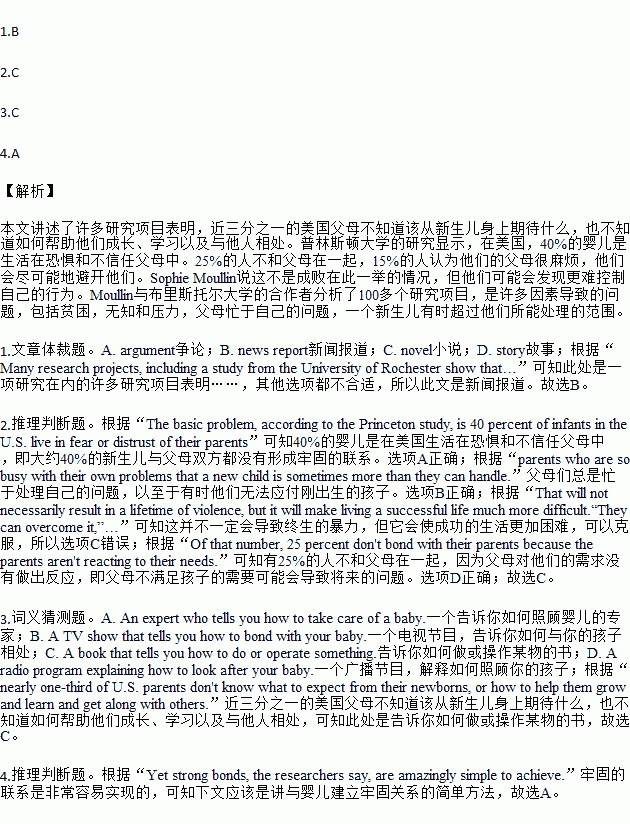题目内容
For too many, the damage begins early in life. Four out of 10 infants(婴儿) born in the United States do not form a strong bond(关系)with either parent, and they will pay for that the rest of their lives.
Many research projects, including a study from the University of Rochester show that nearly one-third of U.S. parents don't know what to expect from their newborns, or how to help them grow and learn and get along with others. Babies, as others have pointed out, don't come with an owner's manual.
The basic problem, according to the Princeton study, is 40 percent of infants in the U.S. live in fear or distrust of their parents, and that will turn into aggressiveness(侵犯), defiance(挑衅)and hyperactivity(多动) as they grow into adults.
Of that number, 25 percent don't bond with their parents because the parents aren't reacting to their needs. And 15 percent find their parents so troubling that they will avoid them whenever possible.
That will not necessarily result in a lifetime of violence, but it will make living a successful life much more difficult.
“They can overcome it,” sociologist Sophie Moullin of Princeton, lead author of that study, said in a telephone interview. “It's not a make or break situation, but they might find it harder to control their behavior.”
Moullin, along with coauthors from Columbia University and the University of Bristol in England, analyzed more than 100 research projects, to reach their conclusions.
Many factors cause the problem, including poverty(贫穷), ignorance(无知), and stress among parents who are so busy with their own problems that a new child is sometimes more than they can handle.
Yet strong bonds, the researchers say, are amazingly simple to achieve.
1.According to the writing style of the passage, it may be a(n) _______________.
A.argument B.news report C.novel D.story
2.Which of the following is NOT true?
A.About 40% of the newborns do not form a strong bond with either parent.
B.Some parents are too busy with their own problems to handle a new child.
C.Infants who fail to bond with their parents are sure to have an unsuccessful life.
D.Parents’ failing to respond to their babies’ need may lead to future problems.
3.What is the meaning of the underlined word “manual”?
A.An expert who tells you how to take care of a baby.
B.A TV show that tells you how to bond with your baby.
C.A book that tells you how to do or operate something.
D.A radio program explaining how to look after your baby.
4.What may be discussed in the following paragraph?
A.Simple ways of achieving strong bonds with an infant.
B.Examples of the consequences of lacking strong bonds.
C.Findings of other similar project concerning this topic.
D.Reasons for failing in building up strong bonds with a child.

